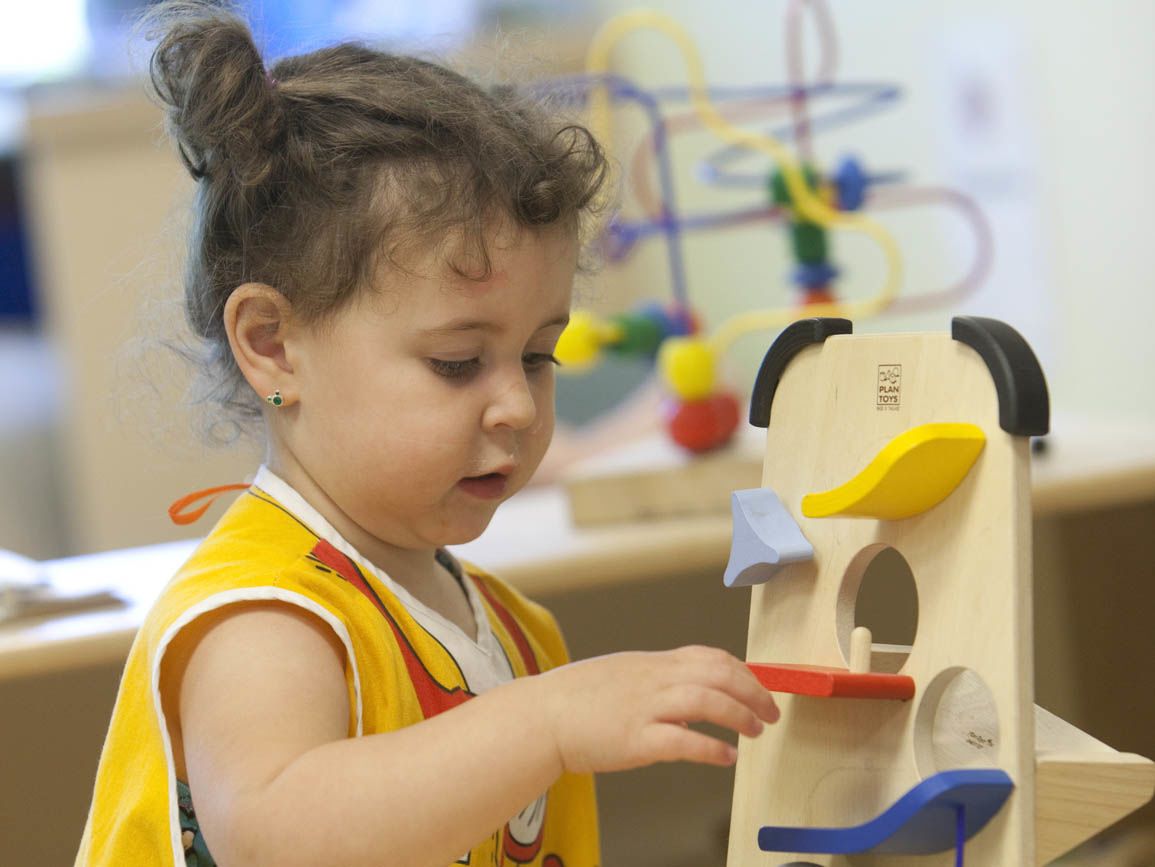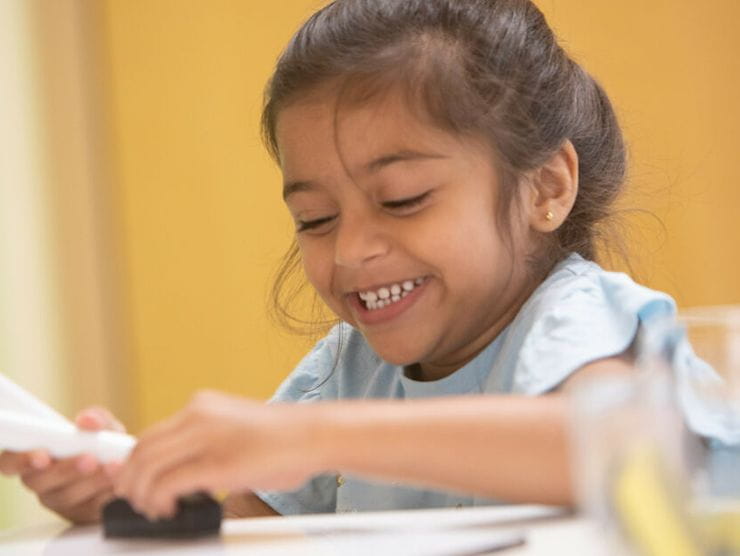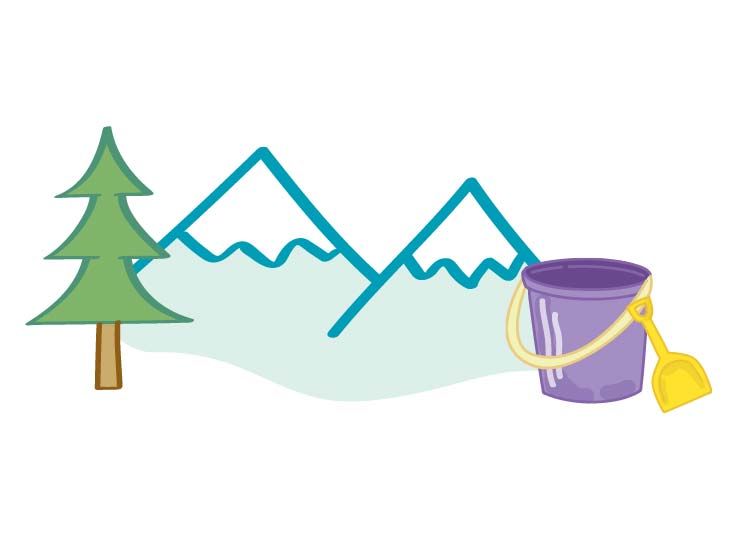

MSU Extension Child & Family Development
The importance of critical thinking for young children.
Kylie Rymanowicz, Michigan State University Extension - May 03, 2016
Critical thinking is essential life skill. Learn why it is so important and how you can help children learn and practice these skills.

We use critical thinking skills every day. They help us to make good decisions, understand the consequences of our actions and solve problems. These incredibly important skills are used in everything from putting together puzzles to mapping out the best route to work. It’s the process of using focus and self-control to solve problems and set and follow through on goals. It utilizes other important life skills like making connections , perspective taking and communicating . Basically, critical thinking helps us make good, sound decisions.
Critical thinking
In her book, “Mind in the Making: The seven essential life skills every child needs,” author Ellen Galinsky explains the importance of teaching children critical thinking skills. A child’s natural curiosity helps lay the foundation for critical thinking. Critical thinking requires us to take in information, analyze it and make judgements about it, and that type of active engagement requires imagination and inquisitiveness. As children take in new information, they fill up a library of sorts within their brain. They have to think about how the new information fits in with what they already know, or if it changes any information we already hold to be true.
Supporting the development of critical thinking
Michigan State University Extension has some tips on helping your child learn and practice critical thinking.
- Encourage pursuits of curiosity . The dreaded “why” phase. Help them form and test theories, experiment and try to understand how the world works. Encourage children to explore, ask questions, test their theories, think critically about results and think about changes they could make or things they could do differently.
- Learn from others. Help children think more deeply about things by instilling a love for learning and a desire to understand how things work. Seek out the answers to all of your children’s “why” questions using books, the internet, friends, family or other experts.
- Help children evaluate information. We are often given lots of information at a time, and it is important we evaluate that information to determine if it is true, important and whether or not we should believe it. Help children learn these skills by teaching them to evaluate new information. Have them think about where or who the information is coming from, how it relates to what they already know and why it is or is not important.
- Promote children’s interests. When children are deeply vested in a topic or pursuit, they are more engaged and willing to experiment. The process of expanding their knowledge brings about a lot of opportunities for critical thinking, so to encourage this action helps your child invest in their interests. Whether it is learning about trucks and vehicles or a keen interest in insects, help your child follow their passion.
- Teach problem-solving skills. When dealing with problems or conflicts, it is necessary to use critical thinking skills to understand the problem and come up with possible solutions, so teach them the steps of problem-solving and they will use critical thinking in the process of finding solutions to problems.
For more articles on child development, academic success, parenting and life skill development, please visit the MSU Extension website.
This article was published by Michigan State University Extension . For more information, visit https://extension.msu.edu . To have a digest of information delivered straight to your email inbox, visit https://extension.msu.edu/newsletters . To contact an expert in your area, visit https://extension.msu.edu/experts , or call 888-MSUE4MI (888-678-3464).
Did you find this article useful?
Early childhood development resources for early childhood professionals.
new - method size: 3 - Random key: 1, method: tagSpecific - key: 1
More About Child & Family Development
Mi parenting resource, bees, building early emotional skills, for early childhood professionals, self-paced positive discipline online course, stories for sprouts and seedlings: the very impatient caterpillar.
Published on May 20, 2020
More About Family
Ac3-pod-cast-episode-5-families-against-narcotics.
Published on December 17, 2021
AC3 Podcast episode 3
Published on June 30, 2021
Facing Challenging Times on the Farm
Published on March 7, 2023
- approaches to learning
- child & family development
- cognition and general knowledge
- early childhood development
- life skills
- msu extension
- rest time refreshers
- approaches to learning,
- child & family development,
- cognition and general knowledge,
- early childhood development,
- life skills,
- msu extension,

For Employers
Bright horizons family solutions, bright horizons edassist solutions, bright horizons workforce consulting, featured industry: healthcare, find a center.

Navigate to your portal
Select a path to log in to your desired Bright Horizons website.
Child Care Center
Access your day-to-day childcare activities and communications through the Family Information Center.
Employee Benefits
Access your employer-sponsored benefits such as Back-Up Care, EdAssist, and more.

Child Care Center.
Locate our child care centers, preschools, and schools near you
Need to make a reservation to use your Bright Horizons Back-Up Care?
I'm interested in
Developing critical thinking skills in kids.

Developing Critical Thinking Skills
Learning to think critically may be one of the most important skills that today's children will need for the future. In today’s rapidly changing world, children need to be able to do much more than repeat a list of facts; they need to be critical thinkers who can make sense of information, analyze, compare, contrast, make inferences, and generate higher order thinking skills.
Building Your Child's Critical Thinking Skills
Building critical thinking skills happens through day-to-day interactions as you talk with your child, ask open-ended questions, and allow your child to experiment and solve problems. Here are some tips and ideas to help children build a foundation for critical thinking:
- Provide opportunities for play . Building with blocks, acting out roles with friends, or playing board games all build children’s critical thinking.
- Pause and wait. Offering your child ample time to think, attempt a task, or generate a response is critical. This gives your child a chance to reflect on her response and perhaps refine, rather than responding with their very first gut reaction.
- Don't intervene immediately. Kids need challenges to grow. Wait and watch before you jump in to solve a problem.
- Ask open-ended questions. Rather than automatically giving answers to the questions your child raises, help them think critically by asking questions in return: "What ideas do you have? What do you think is happening here?" Respect their responses whether you view them as correct or not. You could say, "That is interesting. Tell me why you think that."
- Help children develop hypotheses. Taking a moment to form hypotheses during play is a critical thinking exercise that helps develop skills. Try asking your child, "If we do this, what do you think will happen?" or "Let's predict what we think will happen next."
- Encourage thinking in new and different ways. By allowing children to think differently, you're helping them hone their creative problem solving skills. Ask questions like, "What other ideas could we try?" or encourage your child to generate options by saying, "Let’s think of all the possible solutions."
Of course, there are situations where you as a parent need to step in. At these times, it is helpful to model your own critical thinking. As you work through a decision making process, verbalize what is happening inside your mind. Children learn from observing how you think. Taking time to allow your child to navigate problems is integral to developing your child's critical thinking skills in the long run.

Recommended for you

- preparing for kindergarten
- language development

- Working Parents
- digital age parenting

- Student Loans
We have a library of resources for you about all kinds of topics like this!

IMAGES